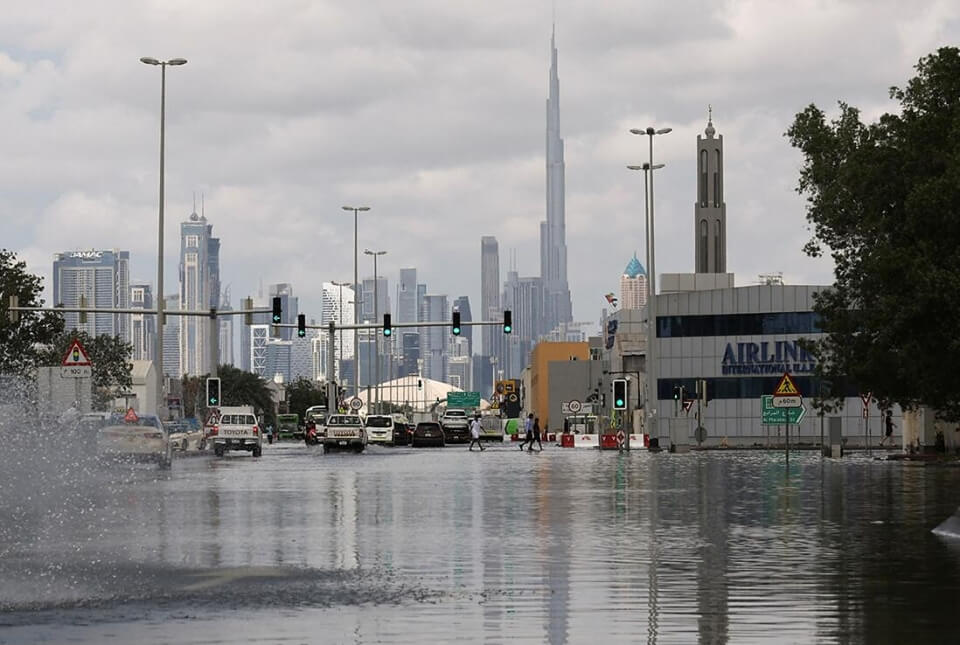Legal blog
The Procedures of Insurance Claims After the Major Floods in the UAE

Insurance losses/claims:
It has been reported that the UAE has witnessed its heaviest rainfall in 75 years from late Monday the 15th of April till Tuesday night the 16th of April. The weather department recorded the highest rainfall in Al Ain, reaching 254 mm in less than 24 hrs and this was an exceptional event.
Various places were hit by floods, water logging in major roads, and streets inundated by flood waters. Dubai International Airport encountered substantial issues, flooding affected popular shopping centers, vehicles and cars were submerged, etc. Hundreds of tow trucks have been operating on the streets of Dubai and Sharjah, to help motorists to recover their vehicles, either submerged in water or broken down.
The insured public may lodge their claims and insurance companies will process and settle these claims, subject to the policy terms and conditions.
Quite often, the insured public, brokers, insurance companies, and reinsurers may be uncertain on:
(A) Policy coverage
(B) Proximate cause and remote cause
(C) Extent of damage - whether it is ‘total loss’ or ‘partial loss’
(D) Under-insurance
(E) Double insurance and contribution
(F) Subrogation/recovery rights
(G) Quantum of loss and salvage value
(H) 72 hours clause
The following are other features that are associated with specific insurance or reinsurance contracts:
(A) Motor Policies:
1. Policy specifically excludes natural disasters such as floods.
2. Parking or driving the motor vehicle in submerged waters.
3. The vehicle owner or driver tried to turn on the engine but the engine was damaged due to the entry of water.
4. No cover is available for hydrostatic locks or no engine protection covers.
5. The motorist intentionally drove the vehicle on a flooded road or failed to avail roadside assistance services.
(B) Fire Policies:
1. Claim is under fire & allied peril policies, where flood & inundation perils are not covered.
2. Breach of pallet or stillage warranty.
3. Due diligence – negligence to protect the insured property or improper maintenance of drainage/gutters.
4. Deterioration of stock.
5. Loss of profit/consequential loss, denial of access, suppliers’ extension, public utilities.
6. Care custody & control clause or goods held in trust.
7. Landlord’s liability.
(C) Marine Cargo Policies:
1. Insurable interest and INCOTERMS.
2. Insured against basic cover - flood & inundation perils are not covered.
3. Loss occurred at intermediary storage or termination of transit.
4. Property to be covered under other policies.
5. Breach of warranty- not transported by closed vehicle or not covered by tarpaulin sheet.
(D) Engineering Policies:
1. Temporary facilities.
2. Free-issue materials.
3. Additional customs duty, debris removal, owner’s surrounding properties, properties under care & custody, offsite storage cover, cessation of work, leased equipment, 50:50 clause, sectional clause, debris removal, dewatering clause, special condition concerning flood & inundation.
(E) Reinsurance Contract:
1. Cat/Nat XOL reinsurance contract, retention, limits, and territory.
2. 72 hours clause.
3. Reinstatement premium
Sometimes, there is a very thin line between precautions and unintentional omission, perils covered and exclusions, proximate cause and remote cause, actions within or beyond one’s control, breach of warranty material to the loss or not, etc. Obviously, each case has to be decided individually, based on facts and circumstances.
We have insurance expertise and are happy to provide legal assistance with insurance advisory consultancy, which includes the interpretation of insurance policies and reinsurance contracts. This will help to comprehend, how disputes may be dealt with by the courts, considering the insurance contract.
Written by:
Kaaseb Mohammed AlHassani | Kaaseb Mohamed Alhassani Advocates and Legal Consultancy

This publication is for general information purposes only. It does not purport to provide comprehensive full legal or other advice.
Legal Advice Middle East and the contributors accept no responsibility for losses that may arise from reliance upon information contained in this publication. This publication is intended to give an indication of legal issues upon which you may need advice.
Full legal advice should be taken in due course from a qualified professional when dealing with specific situations.
